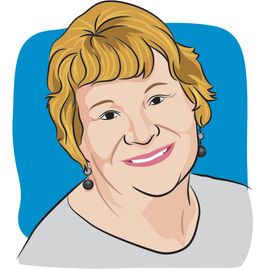- About Us
- Advertise / Support
- Editorial Board
- Contact Us
- CancerNetwork.com
- TargetedOnc.com
- OncLive.com
- OncNursingNews.com
- Terms & Conditions
- Privacy
- Do Not Sell My Information
- Washington My Health My Data
© 2025 MJH Life Sciences™ and CURE - Oncology & Cancer News for Patients & Caregivers. All rights reserved.
How COVID-19 Helped Me Cope Day to Day With Cancer

Jane Biehl is a 12-year survivor of a very rare form of blood cancer, known as myelodysplastic syndrome (MDS). She has enjoyed several exciting careers including a librarian, counselor, teacher, and writer. She loves to write about surviving cancer, overcoming hearing loss and the wonderful benefits of having a hearing-ear service dog.
I was surprised that COVID-19 taught me how to cope with the daily annoyances of cancer.
COVID-19 caused a huge disruption in all of our lives. We were in shock when it seemingly hit out of nowhere and the world locked down. Few of us dreamed that four years later we would still be coping with the ramifications of it.
We have all realized with COVID-19 and cancer how precious life really is, and gratitude is a big part of my life now. But another big thing I learned — to put it bluntly — is “life is a crapshoot.” I shocked an oncologist at the Cleveland Clinic when I told her this after deciding not to have a bone marrow transplant for my myelodysplastic syndrome and going on a new treatment. But I meant it. Too many of my friends and family have died suddenly, become widows and had life-threatening illnesses. They will say to me they never expected to become widowed or ill at such a young age. I tell them sadly that life is like that and we do not have control. However, I will support them no matter what.
Now, workplaces, schools and businesses are continuing to use remote communication for more meetings than ever before. We often Zoom family and friends who are long-distance. Some people are still suffering from long-haul symptoms after having COVID-19. The economy all over the world has fluctuated greatly. The country is l divided over political issues and vaccines and masks are still hot potatoes for people to discuss. We cancer survivors may still be avoiding large crowds, travel and cruises because of our compromised immune systems and fear of becoming ill.
However, I have learned several important things from the lockdown, gradual opening up, and aftereffects of COVID-19. Many of my friends and family have mentioned that they found out how truly cherished those moments with them after not being able to spend so many holidays and special events with them. Our lives were changed; friends and family members were lost and jobs were destroyed, making us feel ever vulnerable. We had already learned some of these things from cancer but COVID-19 gave us a double whammy.
What I have learned is to live and enjoy myself even more. What do I mean? It was not unusual for me to go out almost every night when I was younger. I would work all day and then do volunteering, work side jobs and go to community meetings five nights a week. I kept busy constantly and my minister even asked me what I was running from. Maybe myself? I know part of not wanting to do this anymore is age-related but I love my downtime, nights petting my dog, reading, puttering around and watching television. I am content and happy with myself. COVID-19 drummed this home when I had to go weeks without going out.
Cancer has forced me to slow down. I am unable to go 12 or 14 hours without stopping to rest. I often go out for a few hours, come home and watch some television or rest before I do chores around the house, or sometimes go out again. It is a necessity, not a luxury.
I used to be a big planner. I would get my degree, get married, have kids and live in a house in the suburbs. Several of these events never happened, but I have had other great experiences including writing, travel and speaking that I never dreamed of. I know many people stew and carry on about the future and I get it. I never expected to be diagnosed with cancer in my 50s. I did not even know about pandemics and that millions of people would die all over the world. But many of us did eventually survive both COVID-19 and cancer. I feel blessed and have today. That is enough for me for now.
For more news on cancer updates, research and education, don’t forget to subscribe to CURE®’s newsletters here.
Related Content:



